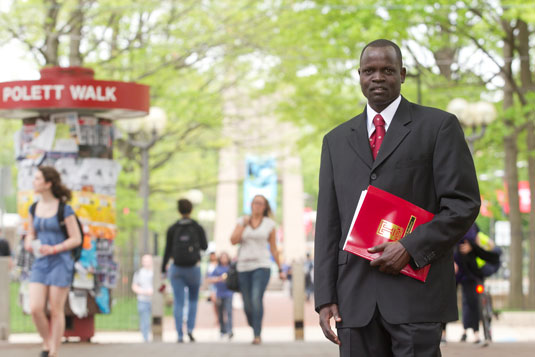Sudanese ‘Lost Boy’ finds his future at Temple

Two civil wars in more than 50 years have claimed the lives of some 2.5 million people in Sudan. Koch Deng Bior considers himself lucky that he wasn’t among them.
Having grown up in the midst of the brutal Second Sudanese Civil War, Bior has endured tremendous hardships to reach this day, as he earns his degree in public health from Temple.
As a young child, Bior fled with his uncle to Ethiopia after being separated from his parents during a government attack that destroyed his village in southern Sudan in 1987. Unrest in Ethopia then led him to seek refuge in Kenya.
In 1992, Bior made the treacherous journey from Ethiopia to Kenya — a frightening three-month, 700-mile walk through the wilderness, at times without food or water.
“Lost Boys...it was a term that was a reality,” said Bior, referring to the name aid workers in refugee camps gave to the more than 20,000 boys like him who were separated from their families during the civil war.
After arriving at the Kakuma Refugee Camp in Kenya, Bior, who speaks Dinka, Arabic and Kiswahili, worked for the International Red Cross as a translator. He helped determine which refugees required additional care in hospitals and provided general support in the community. The opportunity marked the beginning of Bior’s interest in public health.
In the camp, Bior said he became determined to come to the United States for a better life. He qualified for a program to come to the U.S. and arrived shortly before turning 18.
With little formal education and limited English skills, over the next five years Bior worked countless hours at odd jobs, at sites ranging from factories to the local 7-Eleven. He saved money for community college while sending money back to his family in Africa.
“You don’t have a lot of help and you have to start work,” said Bior. "I was by myself and didn’t know anyone. I knew that I wanted to go to school and do what I did in Kenya.”
He came to Temple in 2008 and worked as a security guard to earn his way through school.
“He has overcome so much to get where he is today, and he’s so determined to give back,” said Sylvia Twersky-Bumgardner, assistant chair of the Department of Public Health, who first met Bior three years ago in her “Introduction to Public Health” class. “He wants to help those in the same situation.”
Bior has spoken about his own experiences in Twersky-Bumgardner’s “Complex Emergencies and Forced Migration” course. “He has a unique perspective as a refugee and he worked in the aid camp,” she said.
Bior also shared his experiences with newly arrived refugees when he interned on the health team at Nationalities Service Center in Philadelphia, a nonprofit that provides assistance to immigrants and refugees.
“I was always impressed by his flexibility and eagerness to learn to new things. He was interested in the processes, but also in wanting to get to know people,” said Gretchen Wendel, a NSC clinic liaison.
After graduation, Bior hopes to find a job in the public health field and return to Sudan to visit his mother and brother. (The family never learned the whereabouts of his father.)
“[Public health] is needed in underdeveloped countries like mine in southern Sudan,” he said. “We don’t have a lot of technology like here. There’s a real need for health care.”
But Bior says his plans with school aren’t quite through.
“If God wills it, I’ll go for my masters in public health and maybe even a medical degree,” said Bior. “That’s my dream. I want to do something better. I want to help other people who came just like me.”
—Anna Nguyen